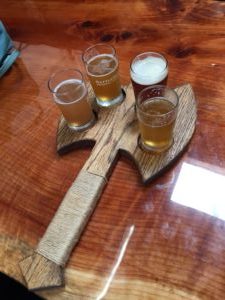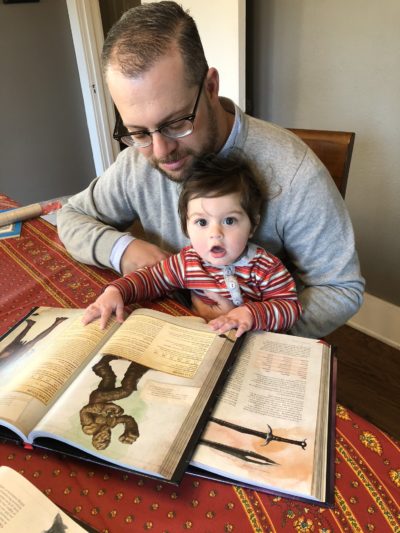Dungeons & Dragons has exploded in popularity in recent years – it’s a different world compared to my experience in the late 80’s. I’ve been digging back into the game as I teach it to my wife’s nephews. There are now countless D&D podcasts, live streams, blogs, and supplemental 3rd-party products (authorized and otherwise.) There’s even a D&D-themed brewery here in San Diego County (BattleMage Brewing – check them out if you like nice folks and good beer. Here’s a photo that I took while enjoying their offerings.) The community of D&D fans and players is now fully a part of the game.

However, the game itself remains the intellectual property of Wizards of the Coast (“WotC” – the current publisher and official rights holder.) So whether you’re a casual fan or a hardcore RPG (role playing game) enthusiast, what do you need to know about intellectual property in order to stay on the Lawful Good side of IP law?
IP Basics
This blog post is concerned mainly with two branches of IP law: trademarks and copyrights.
 A trademark can be a word, phrase, symbol, or anything that identifies and distinguishes the source of the goods or services of one party from those of others. Your trademarks tell the world that you are the source of the goods they are buying. Examples of trademarks owned by WotC are DUNGEONS & DRAGONS, MONSTER MANUAL, and the stylized “&” logo.
A trademark can be a word, phrase, symbol, or anything that identifies and distinguishes the source of the goods or services of one party from those of others. Your trademarks tell the world that you are the source of the goods they are buying. Examples of trademarks owned by WotC are DUNGEONS & DRAGONS, MONSTER MANUAL, and the stylized “&” logo.
Note that a trademark can be registered by a government agency (in the U.S., that’s the United States Patent and Trademark Office – “USPTO”), but it doesn’t have to be registered in order for the owner to have certain legal rights. So when I say “trademark” I’m not specifically referring to registered trademarks.
Click here for more info about trademarks
Copyright law protects original works of authorship including literary, dramatic, musical, and artistic works, such as books, movies, songs, computer software, and works of visual art. Copyright protects the form of expression – the underlying ideas are not copyrightable. As with trademarks, a copyright doesn’t have to be registered in order to be valid and legally protectable. Examples of copyrights owned by WotC are the text of any official manuals, guidebooks, or modules that they publish.
Click here for more info about copyrights
One more key point before we proceed: WotC owns all the officially-published D&D content. But if you create your own content within the D&D universe (assuming you’re following the terms of WotC’s licenses, which are described below), you own that content. This includes written works, illustrations, video or audio content, you name it.
On to the Questions
I went into Reddit’s Dungeons & Dragons forum and asked for IP-related questions. The response was overwhelming, so thanks to everyone who participated. I’ve picked a few to answer here – sorry if I can’t cover them all.
I received this question via direct message:
If one were to do a written or video guide walking newbie DMs through an adventure like the starter set’s lost mine of Phandelver would there be any issues talking/writing about some of the content that happens in the adventure? Where is the line with discussing/sharing about paid adventure content?
You’re free to describe, discuss, or criticize any published content in any format that you like. This is more or less the same as posting a summary and review of the latest Star Wars movie (p.s. I liked The Last Jedi, come @ me.) However, you should avoid copying chunks of text or reproducing images.
So it would be OK to say “be careful when you enter the 2nd floor of the dungeon, there’s a clever trap that does this and that.” It wouldn’t be OK to open the book and read the description word for word.
Reddit user bulbaquil asked three questions:
- Names (of species/classes/creatures/places/etc.): How similar is too similar, especially in “gray areas” in which the name isn’t explicitly marked as IP (e.g. it’s an OGL race such as “tiefling” or “duergar”) but yet is seldom if ever seen outside the context of D&D?
This requires a bit of explanation. WotC wants to encourage D&D enthusiasts to create and sell products that fit within the game – within certain limits. Those limits are defined by WotC’s Open Gaming License (“OGL”). This link directs you to the most recent version of the OGL. If you want to create and sell content within the D&D universe, you must obey those rules. You are strongly advised to read that document.
OK, so the OGL is a license that allows you to use certain elements of D&D to create your own content. But what are those elements? WotC publishes those elements in what they call the Systems Reference Document (“SRD” – sorry for all the acronyms.) The SRD is essentially a simplified version of D&D’s rules. Lots of extras found in the various D&D rulebooks (often referred to as “flavor”) are excluded from the SRD. So you can only publish and sell user-created content that falls within the SRD. If there’s something – for example, a specific monster – that’s found in one of the D&D rulebooks or modules, but isn’t in the SRD, you can’t include it in your own self-published content.
Note – in some online discussions of SRD, it’s referred to as excluding “WotC IP.” That’s not entirely accurate. Lots of content in the SRD is arguably the intellectual property of WotC – they’re just giving you permission to use it free of charge.
If you want your self-published content to include all of the “flavor” and extras that make D&D so fun, there’s another option: you can publish it through the Dungeon Masters Guild. WotC splits the proceeds from DM Guild content 50/50. So it’s up to you whether you want to keep it simple, and keep all of the funds for yourself, or to fully embrace the D&D world and share half of the revenue.
Let’s assume that the word TIEFLING is a trademark owned by WotC. In D&D, tieflings are a race of demonic humanoid. Tieflings are included in the SRD, so you’re free to create and publish content that includes tieflings.
Now, “how similar is too similar” is one of the core questions of trademark law, and the real answer is that it’s different in every case. If you want to create your own version of an official D&D race that’s not found in the SRD, proceed with caution. If the name that you choose for your race is similar in sound or appearance to the official version, you are likely infringing on WotC’s trademark. Likewise, if the race has a different name, but shares substantial unique characteristics with the official version, copyright may come into play.
Reddit user alkonium asks a related question:
Can something be a registered trademark and be declared Open Game Content?
Yes, WotC could register a word, phrase, or image as a trademark and still include in the OGL.
Back to bulbaquil’s questions:
2. Streaming: what special considerations do streamers and players in a live-streamed game need to concern themselves with?
Players who live-stream their games are, in most cases, free to use WotC content or to create their own. Arguably, WotC could ban all such activity, but there’s no incentive for them to do so.
User Tumnus-7 asks a related question:
I’ve always wondered how some of the more popular D&D 5e podcasts have been permitted to continue. Are they limiting themselves to the SRD? Probably not in all cases. Things like beholders…those are unique D&D IP.
I think there has to be an element of “WOTC likes the publicity,” and that this “free advertising” causes a lack of enforcement by WOTC. But if that’s true, that would also have the effect of watering down their IP rights.
You’re essentially right. WotC wants to encourage people to buy their products, and these podcasts are a valuable (and free) marketing engine for them. There’s not much danger of WotC’s IP rights being “watered down.” As long as it’s clear to the general public that DUNGEONS & DRAGONS and related trademarks are owned by WotC and are not generic terms for categories of products, their trademark rights will remain strong. WotC does, from time to time, go after parties that it sees as infringing on their rights. They’re not obligated to shut down every podcast – even if it’s arguably infringing – in order to retain their IP.
On to bulbaquil’s final question:
3. “Plagiarism in ignorance”: You come up with A, which is suspiciously similar to B… only you’ve never heard of B before in your life until someone points it out to you after you’ve published A.
This is a common question in copyright law. One core point to remember is that ideas are not protected by copyright – only the original expression of those ideas is protected. The basic concepts of many D&D adventures are similar (break into a dungeon and kill a monster, save a town from an evil wizard, rescue or protect someone, that kind of thing.) Nobody can “own” these types of plotlines. However, WotC, or any other content creator, does own the original expression. Generally speaking, this applies to the actual words on the page – scene and character descriptions, dialogue, etc. The same is true for illustrations, maps, and other visual content.
So, for example, if you want to publish an adventure in which characters have to band together to destroy an evil magic item and prevent a monster from taking over a fantasy world, that’s no problem. If you want to publish an adventure in which characters have to band together to destroy The One Ring and prevent Sauron from taking over Middle-earth, you’ve gone too far.
As to the specific question: in order to prove copyright infringement in a court of law, the alleged infringer must have had “access” to the original work. This usually means that there’s at least a reasonable chance that the alleged infringer was exposed to the original. Everyone’s been exposed to The Lord of the Rings, so in my example above, the court would assume access. But if you’re alleged to have copied some obscure third-party D&D content, unless your copy is so identical that there’s no reasonable chance that it was a coincidence, the plaintiff will have to demonstrate that you had access to their content.
Reddit user Xunae asks:
Using someone else’s IP at my table…If I import a model or image that the original creator didn’t have rights to, like Mickey Mouse or something, how much trouble could I get into if Walt Disney’s frozen head were to see us stabbing Mickey’s corpse?
I had to include that one just because of the colorful example.
Technically, any copy of someone else’s copyrighted work is an infringement. If you print out an illustration of Mickey Mouse that you found online, you’ve infringed Disney’s copyright. That said, there’s not much incentive for copyright owners to go after private, home-based uses of content. It’s when you publish that content online (whether or not it’s for sale) that you are likely to run into trouble.

OK, that’s as much as I could cover in one post. If you have other questions, please feel free to leave comments, and I’ll do my best to post a follow-up.
In the meantime, please enjoy this picture of me teaching my 9-month-old son, Miles, about D&D and totally blowing his mind.

